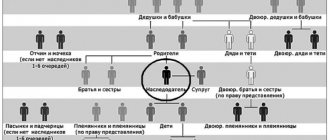Consulting lawyer › Family law
Send
- What influences court decisions?
- How can a father sue a child from his mother?
When a married couple separates, the question sometimes arises: how to sue a child in a divorce? Moreover, in this topic the question is divided into two, such as: how to sue a child from the father and how to sue the child from the mother, and is it even possible to do this?
These questions can often be found online and are often heard by legal consultants. This topic is quite sensitive and both fathers of children and mothers are interested in it. To understand this topic, you should refer to the legislation of the Russian Federation and find out all the key concepts, rights and rules, as well as the procedure.
Father's rights to children after divorce
The desire of the spouse to take the children away may be a consequence of the fear of interrupting communication with them, losing contact, ceasing to influence the life of their son or daughter, or not being able to see each other. If in a marriage the husband showed love and care for the children, and communication with him does not pose a threat, it is necessary to convince the spouse that his paternal rights will not be infringed.
In accordance with Art. 66 of the RF IC, a husband living separately can communicate with his children and take part in their upbringing and education. The ex-wife should not interfere with this by limiting communication with her father in any way.
The father will be able, as before, to organize the child’s leisure time, pick him up from school or preschool, and take an interest in his progress and behavior.
If the above arguments do not convince the spouse to act in the interests of the children, cancel the developed tactics of intimidation and blackmail, and you should prepare to go to the courts and defend your rights to live with the minor.
In what cases can a husband take the children?
When determining the place of residence of common children, they are guided by the norms of the RF IC and the Convention on the Rights of the Child, adopted on November 20, 1989. In Art. 9 of the document states that a minor should not be separated from his parents except in cases where this is necessary for his good.
The mother may lose not only the right to live with her children, but also parental rights in general if her behavior poses a threat to their health and emotional stability.
When deciding on the place of residence of minors, the court will side with the husband if:
- the woman suffers from alcoholism and takes drugs;
- refuses to provide financial support for the child;
- shirks parental responsibilities and does not educate;
- uses violence against a minor;
- keeps children in unsanitary conditions and does not provide them with appropriate living conditions;
- leads an immoral lifestyle.
The above facts must be documented. The presence of addictions in a woman is confirmed by relevant certificates from a psychoneurological dispensary, and the inadequacy of the child’s living conditions is confirmed by the conclusion of an inspection of the guardianship and trusteeship authorities.
The age of the children also plays a role in determining the place of residence.
According to Art. 57 of the RF IC, after children reach 10 years of age, all issues affecting their interests are subject to mandatory approval. The opinion of adolescents is heard in court and influences the decision to determine their place of residence.
If the husband does not have evidence of his wife’s immoral lifestyle or bad habits, and the child is in favor of living with his mother, there is no need to worry. In such cases, the judge will not support the husband’s desire to take away his son or daughter.
What to do if your husband threatens to take your child away during a divorce?
The spouse’s threats to take away the children have a depressing effect and sow fear and doubt, but knowledge of the laws will help you choose the right course of action in a difficult life situation.
Appeal to the World Court
Divorces where there is a common child are dissolved in a district court or before a magistrate.
If it is possible to convince the spouse not to conflict, but to act mutually, trying to create a favorable atmosphere for children for development and learning, a settlement agreement is concluded (Article 24 of the RF IC).
The document states with whom the child will live, on what days to see the other parent, indicates the duration of visits, and the conditions for spending time together during the holidays. The number of clauses in the contract, their detail depends entirely on the will of the parents. The detail is welcome because it eliminates disagreements between former spouses in the future.
Appeal to the district court
If the husband unreasonably continues to threaten to take the child away and does not agree to conclude a settlement agreement, you should file a claim with the district court to determine the place of residence of the minors.
When living together with a child, the application is submitted at the place of residence of the plaintiff (Article 29 of the Code of Civil Procedure of the Russian Federation).
The form and content of the document must comply with the provisions of Art. 131 Code of Civil Procedure of the Russian Federation.
Sample claim for determination of place of residence:
The claim indicates the place where the document was filed, information about the plaintiff, the defendant, and details the circumstances of the case: when the marriage was concluded (divorced), where the minor currently lives, why the child should live with the mother, what in the father’s behavior indicates his reluctance to act in the interests of children, what measures have been taken to resolve the issue peacefully.
It is important to provide compelling arguments in your favor. To confirm her good intentions and the availability of opportunities to raise minors, the wife must present to the judge:
- income certificate;
- characteristics from the place of work;
- testimony from school or preschool employees about the mother’s role in raising the child, participation in public life, interest in his progress and behavior in the children’s team;
- conclusion of a psychologist about attachment to the mother;
- a certificate from a psychoneurological dispensary confirming the absence of harmful addictions to alcohol, drugs, sanity and mental health;
- a certificate from the local police officer confirming that he has not been brought to the police;
- conclusion of the guardianship and trusteeship authorities on living conditions.
The documents must neutralize any attacks from the spouse. The husband’s arguments, such as: “bad mother”, “does not care about the children”, “drug addict and alcoholic”, which do not have documentary evidence, will be regarded by the judge as groundless.
Terms of consideration
According to Art. 154 of the Code of Civil Procedure of the Russian Federation, the duration of consideration of the case in court is up to 2 months from the date of receipt of the statement of claim.
The duration of the process may be increased if the defendant does not appear at the court hearing, evades receiving notice, or files a request to postpone the case.
If the defendant was notified of the time and place of the hearing, but did not appear, did not file a motion to postpone the case for a good reason, or is absent due to no fault of an emergency, the judge has the right to consider the case without him (Article 167 of the Code of Civil Procedure of the Russian Federation).
Arbitrage practice
An analysis of precedents shows that the courts take a comprehensive approach to solving the problem. Often, in the event of a dispute regarding children, counterclaims from the parents are considered simultaneously. During the hearings, psychological examinations are ordered about the child’s attachment and methods of raising him.
The testimony of witnesses named by the plaintiff and the defendant is heard. The proof is the conclusion of the responsible guardianship officer, who, for his part, verifies the possibility of the minor living with the mother or father. In addition, characteristics from the place of work and residence are assessed.
Below are a few precedents. From them we can conclude that when the father took the child against the will of the mother, the courts do not always side with the latter.
Main reasons for refusal:
- regular violence;
- addiction to alcohol;
- incorrectly chosen parenting tactics.
The courts justify each of the listed circumstances in their decisions. In some cases, the reasons for the position take up several pages.
Application of international law
The Borodino District Court of the Krasnoyarsk Territory considered the mutual claims of the father and mother in a dispute over establishing the place of residence of a minor girl. The woman insisted that the father took the child by force.
In turn, the man insisted that only he could provide for his daughter financially and provide her with decent conditions for raising her. He referred to the fact that his daughter was drawn to his parents - grandparents.
During the consideration of the case, witnesses from each side were questioned, materials from the guardianship, psychologists and teachers were studied. In the text of the final decision, reference was made to the Declaration of the Rights of the Child, approved by the UN General Assembly on November 20, 1959.
From its meaning it follows that a small child should remain with his mother, except in cases of exceptional circumstances. Father did not bring such people. As a result, by decision dated August 05, 2016 in case No. 2-364/2016, the girl’s place of residence was determined with her mother.
If the fault is on the mother's side
When assigning the place of residence of a minor to one of the parents, the courts take into account various circumstances. One of them is methods of education, as applied to children of the appropriate age.
An example of this is the conflict resolved by the Kalininsky District Court of Novosibirsk in the matter of establishing the daughter’s future address of residence. During the investigation, a forensic psychological examination was ordered. She found that the girl was equally attached to both parents. At the same time, father's methods of education are more effective.
As a result, by the decision of June 27, 2016 in case No. 2-1686/2016, the man’s demands were satisfied. In turn, the court established the conditions for the mother to meet with her daughter.
When a woman abuses alcohol
In the case considered by the Cannes City Court of the Krasnoyarsk Territory, the mother set herself the goal of taking her son away from his father, whom he had forcibly taken. In turn, the defendant objected to the demands.
According to his explanations, he had to take the boy away because his ex-wife abused alcohol.
Witnesses confirmed that several times the woman came to pick up her child at kindergarten late and smelled of alcoholic beverages. In addition, the plaintiff underwent rehabilitation for alcohol addiction in a specialized clinic.
Taking into account the above circumstances, the court, by decision of December 25, 2017, in case No. 2-28177/2017, rejected the applicant. Thus, leaving the son with his father.
Restricting the husband's actions in relation to the child
Unbalanced, temperamental, aggressive men pose a threat because during a divorce they can behave unpredictably: threaten to kidnap the child, take them out of the country, hide them. In these cases it is necessary:
- Limit contact between children and father as much as possible. According to the law, a woman does not have the right to interfere with the second parent in the exercise of parental rights, therefore, before receiving a court decision on divorce and determination of place of residence, it is necessary to act within the framework of the law: file a lawsuit to limit or deprive the father of parental rights. If the husband does not pose a threat, but is driven by a feeling of love for the children, communication is limited to sending the minors to their grandmother, to a camp, or in some other humane way.
- The father will not be considered a kidnapper, and contacting the police will not yield results, but it is possible to limit the removal of the child outside the country. To do this, you must submit an application for an export ban to the General Directorate for Migration. It is not necessary to notify the father about this, but if he tries to cross the border of the Russian Federation, he will not be able to leave with the child.
- If the husband is abusive or tries to take the children away using physical advantage, it is necessary to contact the police and the emergency room of a state medical institution within 1-2 days after the incident to examine the damage caused. If the beatings are not visually visible, record complaints of pain and dizziness with a doctor. The issued documents can subsequently be presented in court.
Sample application for an export ban:
In the period before a court decision is made on the procedure for communicating with the child and determining his place of residence, the mother’s task is to remain calm and ensure the safety of herself and the child.
Court receptions
Life shows that when a father with bad intentions wants to take his son to him at any cost, any methods are used. They sometimes go beyond the law. Therefore, women need to be aware of countermeasures.
Other people often come to help with this and can confirm the circumstances of the case. These include friends and neighbors, followers on social networks.
Typical actions of a man:
- use of financial opportunities;
- working with witnesses, including encouraging them to give necessary testimony;
- impact on the child himself.
Let's describe several common tricks and ways to counter them. The main thing for a mother is not to sit idly by.
Inaccurate characterization
A man can present to the court information in a positive way about himself that is not true. Both the defendant and her witnesses can refute them. The more people involved, the more weighty the voiced testimony will be for the court.
There are cases when people invited to give explanations openly lie. And a warning about criminal liability does not stop them.
An experienced lawyer can recognize the catch. He will also draw the court’s attention to the existing inconsistencies between the voiced evidence and other evidence.
Fictitious expert opinion
As part of the consideration of the case, the court most often orders a forensic psychological study about the actual relationship between parents and children, the degree of respect for each. And there are situations when an expert colludes with the plaintiff, despite the consequences.
In this scenario, it is necessary to insist on a re-examination. Another specialist will take care of it.
The range of issues to be clarified is identified in advance. They will definitely be reflected in the court ruling.
Bribing a child
Most often it occurs in a situation where a minor has already crossed the threshold of 10 years. Then his opinion of which parent to stay with often becomes decisive.
Some representatives of the stronger sex take advantage of this, promising the child toys, fashionable gadgets, modern things in exchange for his expressing his desire to stay with his father. It is permissible to expose deception.
The same specialists in the field of psychology will come to the rescue. They have techniques in their arsenal that help identify the fact of manipulation.
What to do if your spouse acts illegally?
Disputes surrounding children can be so fierce that the opponent uses illegal methods of struggle. It could be:
- attracting acquaintances and friends who are ready to slander the spouse;
- receiving fictitious certificates from a psychologist about the child’s commitment to his father;
- psychological impact on a minor.
Illegal influence can be neutralized. To do this, you need to take the most responsible approach to proving your integrity and leading a healthy lifestyle: collect certificates, characteristics, and attract witnesses.
If the spouse proves that the child is more attached to him and provides certificates from specialists with a dubious reputation, it is necessary to apply to the court with a request to conduct an additional psychological examination by an independent (preferably state) psychologist.
The study reveals not only the child’s true attachment, but also facts of psychological influence on a minor through bribery with tempting promises: to provide unlimited freedom; buy an expensive item; allow what the wife prohibits.
Revealed offenses will confirm the husband’s dishonesty and the illegality of his actions.
A husband's threat to permanently take away a child during a divorce is illegal and unfounded. The decision on the children's place of residence is made by the judge during the trial.
In fact, the spouse has the same rights to the child as the wife and can take the minor away at any time. Until the official dissolution of the marriage and a decision on the procedure for communicating with children, the father cannot be limited in the exercise of parental rights without compelling reasons. If a mother has information about possible harm to a minor, she should immediately contact law enforcement.
The husband, like the wife, can file a claim to appoint the child’s place of residence with them. The father's chances of winning the case are slim. You will have to prove that the mother does not fulfill parental responsibilities, and living with her could cause harm to the minor. Even if the spouse goes to great lengths and gives false testimony, provides false certificates and decides to bribe witnesses, do not despair.
Lawyers from the site ros-nasledstvo.ru will give detailed answers on what laws to use to protect your interests, how to properly file an objection or complaint, call witnesses and refute your husband’s false arguments.
FREE CONSULTATIONS are available for you! If you want to solve exactly your problem, then
:
- describe your situation to a lawyer in an online chat;
- write a question in the form below;
- call Moscow and Moscow region
- call St. Petersburg and region
Save or share the link on social networks
- FREE for a lawyer!
Write your question, our lawyer will prepare an answer for FREE and call you back in 5 minutes.
By submitting data you agree to the Consent to PD processing, PD Processing Policy and User Agreement
Useful information on the topic
21
Application for divorce to the registry office: sample, form
An official marriage can be dissolved through the judicial authorities or the registry office. Second…
4
How to legally limit a father’s communication with a child after a divorce
Despite the equal rights and responsibilities of father and mother in...
11
How to file for divorce without your wife
It is possible to obtain a divorce without the presence or consent of the wife. The husband's task...
1
Unilateral divorce without the presence of the husband
According to the latest statistics, the number of divorces tends to increase with...
6
Divorce without the presence of one spouse or without the participation of both parties
Divorce can occur under different circumstances: the application is submitted by one...
6
Divorce by proxy
To independently file a divorce requires moral strength, time, and the need for physical...
The ex-husband forcibly took away the child: procedure
In accordance with Article No. 61 of the RF IC, a mother and father have equal rights and responsibilities in relation to their child. Spouses with minor children are divorced through the courts.
If they cannot agree with whom the child will remain and a controversial issue arises, then the court decides which parent the minor citizen will be better off with based on the documents presented. You will need
- - application to court;
- - a package of necessary documents.
Instructions 1 If you have a dispute regarding the place of residence of a minor, file an application with the court. In addition to the application, you are required to submit an inspection report of the living space of the child’s mother and father. The act must be drawn up by the housing commission, which you must call from the housing policy department of the district administration.











